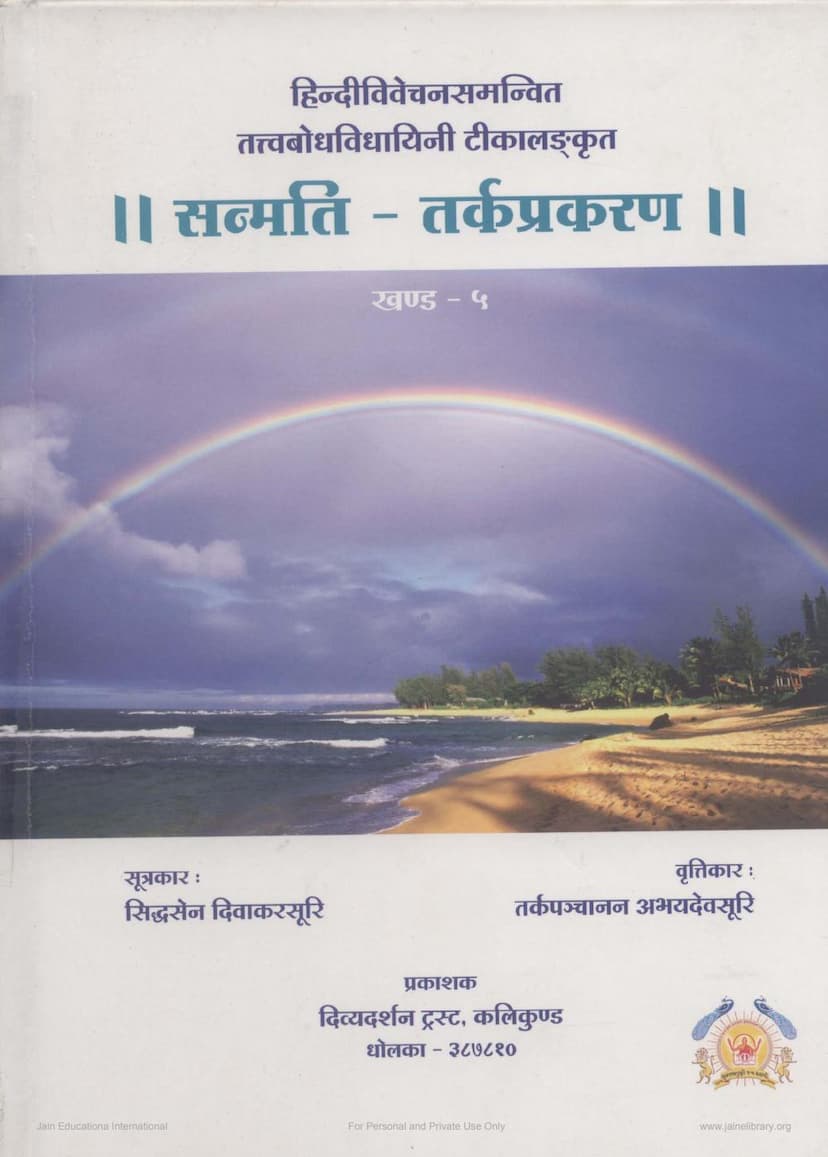Sanmati Tark Prakaran Part 05
Added to library: September 2, 2025

Summary
Here's a comprehensive summary of the Jain text "Sanmati Tark Prakaran Part 05" by Abhaydevsuri, based on the provided pages:
Book Title: Sanmati Tark Prakaran Part 05 (Third Kand, Fifth Part) Author: Written by Siddhasena Divakara Suri, Commentary by Abhaydevsuri Publisher: Divya Darshan Trust
Overall Theme and Significance:
This volume, part of the larger Sanmati Tark Prakaran, is a significant Jain philosophical and logical text. It aims to establish the supremacy of Jain philosophy, particularly its core principles of Syadvada (conditional predication) and Anekantavada (non-absolutism or multi-sidedness), by critically examining and refuting the views of other philosophical schools. This specific part (Part 5) focuses on the interconnectedness of General and Specific entities (सामान्य-विशेषयोः परस्परानुवेधः) and elaborates on the concept of Anekantavada through detailed logical arguments. The text emphasizes that understanding reality requires a multi-faceted approach, rejecting rigid absolutist viewpoints.
Key Concepts and Arguments Presented in this Volume (Based on the Table of Contents and introductory remarks):
The volume delves into complex logical and metaphysical debates within Jain philosophy and in relation to other Indian philosophical traditions. The core arguments revolve around:
- Anekantavada (Non-Absolutism) as the Foundation of Truth: The text consistently argues that only Anekantavada, which accepts multiple perspectives and rejects exclusive, one-sided claims (Eka-kanta-vada), can lead to true understanding and right faith (Samyak-darshan).
- Interconnectedness of General and Specific (सामान्य-विशेष): A significant portion is dedicated to demonstrating that general concepts (like existence, substance) and specific entities (like pots, trees) are not mutually exclusive but are deeply interconnected and interdependent. Rejecting extreme views of either absolute difference or absolute identity between them is crucial.
- Rejection of Eka-kanta-vada (Absolutism): The text systematically dismantles absolutist doctrines from various schools (Buddhism, Nyaya, Vaisheshika, Samkhya, Mimamsa) by exposing their logical flaws and contradictions when applied to fundamental metaphysical concepts.
- Nature of Reality: The text explores the nature of reality through concepts like:
- Dravya (Substance) and Guna (Quality): Debating their relationship, emphasizing their inseparable yet distinct nature, a core tenet of Jainism.
- Paryaya (Modification/Moment): Explaining how modifications are neither entirely separate from nor identical to the substance.
- Vyajan Paryaya (Connotative Modification) vs. Artha Paryaya (Essential Modification): Differentiating between linguistic expressions and the actual modifications of reality.
- Cause and Effect: Discussing the complex interplay of various causes (kala, svabhava, niyati, karma, purushartha) and refuting their isolated claims.
- Anekantavada applied to various Categories: The principle of Anekantavada is applied to concepts like causality, the nature of substances, the validity of knowledge, the existence of generalities (samanya), and the nature of the soul.
- Critique of Other Philosophical Schools:
- Nyaya-Vaisheshika: Critiques their concept of atoms (paramanu), eternal substances, categories of existence (padartha), and particularly their concept of Samavaya (Inherence) and the nature of qualities.
- Buddhism: Addresses the doctrine of momentariness (Kshanika-vada) and the Buddhist understanding of cognition.
- Samkhya: Critiques their concept of Prakriti and Purusha, and their Satcharya-vada (theory of actual transformation).
- The Role of Language and Logic: The text highlights the importance of proper linguistic and logical analysis, especially the use of 'Syat' (perhaps/conditionally) to represent Anekantic truths. It criticizes the rigid adherence to single perspectives (Eka-kanta-vada) in language and logic.
- Refutation of Extremes: The text is characterized by its rigorous logical refutation of opposing viewpoints, presenting their positions as 'purva-paksha' (initial argument) and then systematically dismantling them with 'uttara-paksha' (rebuttal) based on Jain principles.
- The Importance of Study: The introductory and concluding remarks (Ashirvachan, Prakashakiya Nivedan, Sampadak Anubhav) emphasize the profound value of studying this text for understanding Jain philosophy, developing logical acumen, and attaining right faith.
Structure and Content:
The table of contents provided reveals the depth and breadth of the philosophical discussions. It covers numerous specific logical arguments, refutations, and expositions of Jain doctrines, often framed as responses to specific philosophical problems or schools of thought. The detailed breakdown of topics (e.g., "Ekaanta-bheda-paksha mein dōṣa nirūpaṇam" - establishing faults in the doctrine of absolute difference, "Paramaṇu ka utpatti-pralay sa-yuktika" - explaining the generation and dissolution of atoms) indicates a highly technical and analytical approach.
Commentary and Translation:
The presence of a Hindi commentary (Vicharan) and the dedication of the volume to revered Acharyas like Vijay Bhuvanbhanu Suri Gurudev highlight the effort to make this profound philosophical work accessible to a wider audience. The publisher, Divya Darshan Trust, plays a crucial role in preserving and disseminating such important Jain literature.
Overall, Sanmati Tark Prakaran Part 05, authored by Abhaydevsuri, is a sophisticated exploration of Jain logic and metaphysics, dedicated to demonstrating the validity and superiority of Anekantavada and Syadvada by engaging in meticulous debate with other philosophical traditions.